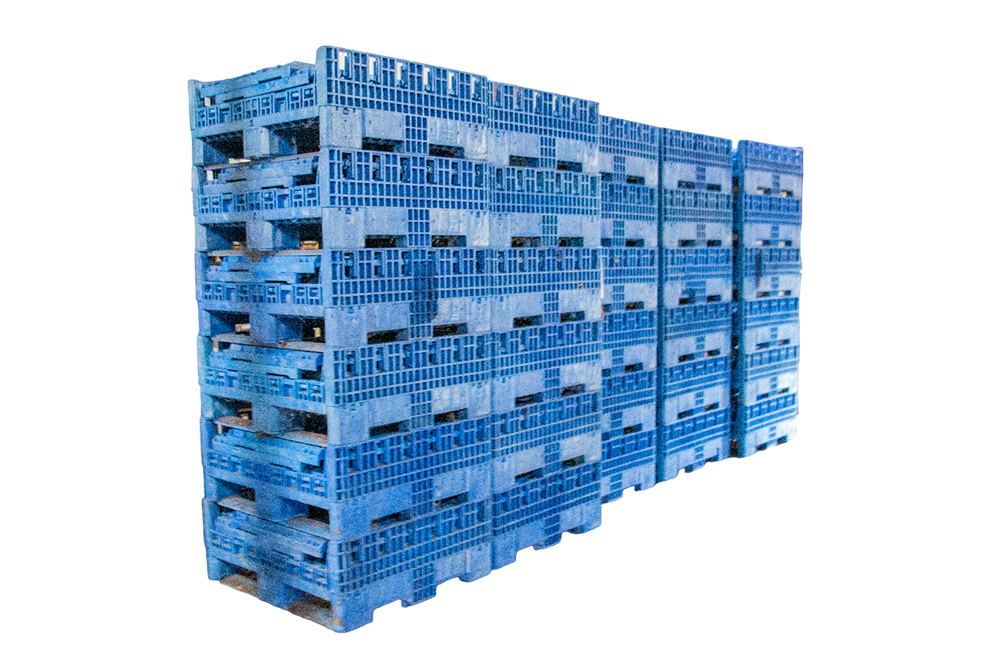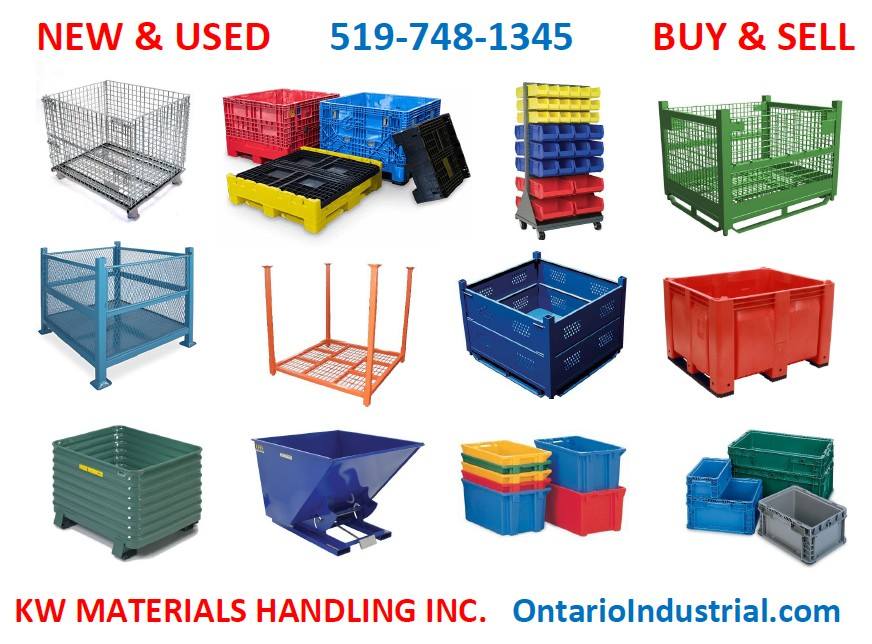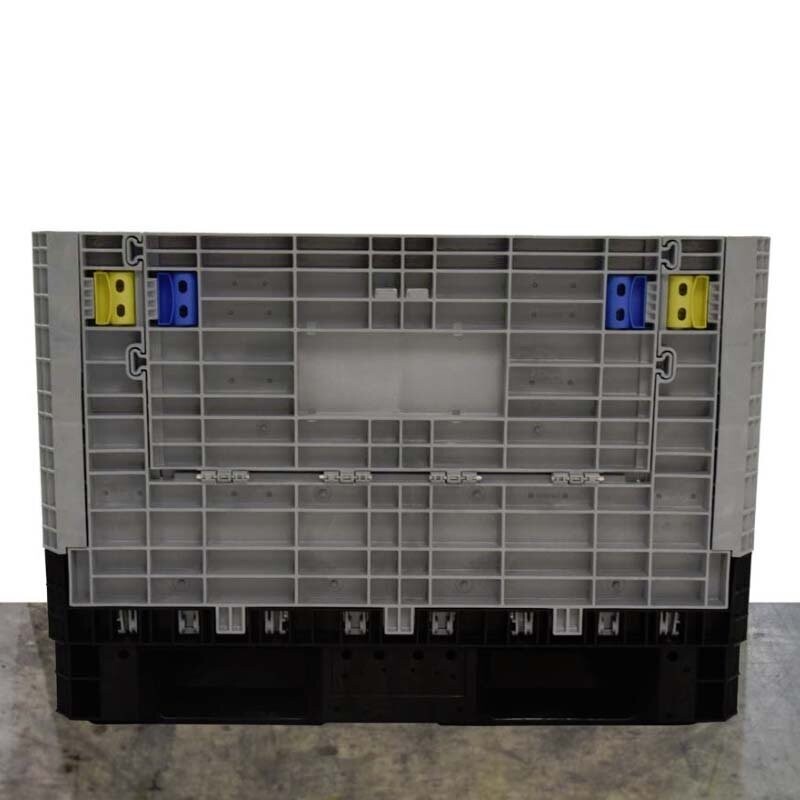Why Mass Containers Are Essential for Cost-Effective and lasting Transport
Bulk containers play a necessary role in modern logistics. They facilitate the efficient movement of big amounts of goods, thus enhancing transport procedures. This approach not just reduces prices but also minimizes environmental impact through lower emissions and waste generation. As industries look for more lasting techniques, the fostering of mass containers is ending up being increasingly significant. What effects does this change hold for future logistics and supply chain management?

The Benefits of Utilizing Bulk Containers in Logistics
Mass containers revolutionize logistics by enhancing performance and sustainability. These containers permit the transportation of big quantities of products in a single trip, substantially decreasing the number of trips called for. This not only improves operations however likewise minimizes labor prices connected with handling, packing, and unloading. Furthermore, mass containers are created to optimize area utilization within transport lorries, guaranteeing that more products can be delivered at the same time.
The standardization of mass containers also simplifies the logistics process. With uniform dimensions, they can be easily stacked and stored, resulting in enhanced storehouse monitoring. Furthermore, bulk containers commonly include sturdy products that shield materials from damages throughout transportation, thus reducing item loss and boosting overall integrity. Therefore, companies can experience enhanced supply chain efficiency, inevitably bring about boosted success and customer satisfaction. This mix of variables makes bulk containers an essential property in modern logistics.
Ecological Impact: Lowering Waste and Carbon Footprint
As sectors increasingly focus on sustainability, the adoption of mass containers has emerged as a vital technique for minimizing waste and decreasing carbon footprints. These containers decrease the use of product packaging products, such as boxes and plastic, consequently notably reducing overall waste generation. By combining shipments, mass containers improve transport effectiveness, permitting more items to be moved per trip. This decrease in trips directly correlates with lower greenhouse gas discharges, contributing to a smaller sized carbon impact.
Moreover, mass containers can usually be recycled or reused, better minimizing ecological influence. The sturdiness of these containers guarantees they can hold up against several transport cycles, minimizing the demand for single-use options. refurbished bulk containers. By improving logistics and promoting efficient source use, bulk containers not only support sustainable methods but additionally urge sectors to straighten with global environmental goals. Ultimately, their application mirrors a dedication to ecological stewardship and responsible resource management
Expense Cost Savings: Exactly How Mass Containers Lower Transport Expenditures
While several firms look for means to improve their lower line, using mass containers offers a substantial possibility for decreasing transport costs. Bulk containers make the most of the volume of items delivered, allowing businesses to ship larger amounts at when. This performance minimizes the variety of trips required, straight lowering fuel expenses and reducing labor expenditures connected with loading and unloading.
In addition, bulk containers often include structured designs that maximize area usage within transportation cars. This suggests fewer voids, bring about extra reliable use offered capability. The resilience of bulk containers can decrease the danger of item damage during transit, making certain and reducing losses that even more items arrive intact.
Enhancing Supply Chain Efficiency With Mass Storage Solutions
Mass storage options play a vital role in boosting supply chain effectiveness by maximizing inventory administration. By settling items right into less, bigger containers, companies can substantially reduce managing prices related to regular transfers and handling. This structured approach permits far better monitoring and monitoring of inventory, eventually bring about boosted operational performance.
Structured Inventory Administration
Efficient stock administration is important for maximizing supply chain procedures, especially when organizations take on bulk storage space options. These options allow companies to maintain greater supply levels while lessening the frequency of replenishment. By consolidating products right into bulk containers, business can simplify their supply procedures, decreasing the complexity related to tracking numerous smaller packages. This method facilitates exact stock counts and boosts projecting precision, permitting more enlightened decision-making. On top of that, mass storage space solutions streamline stockroom company, making it easier to locate and accessibility products when needed. Therefore, organizations can attain a much more efficient inventory turn over rate, inevitably enhancing overall supply chain efficiency and minimizing the possibility of stockouts or overstock circumstances.

Lowered Handling Expenses
The execution of bulk storage space services not only enhances supply management however also substantially decreases handling expenses throughout the supply chain. By consolidating materials into mass containers, firms reduce the need for constant handling and transfer between different storage space and transport units. This method reduces down on labor prices related to loading, dumping, and moving smaller sized plans. Additionally, bulk storage minimizes the frequency of deliveries, leading to lower transportation expenses and reduced gas intake. Therefore, businesses can maximize their logistics procedures, enabling an extra reliable appropriation of sources. Eventually, reduced handling costs contribute to enhanced general supply chain effectiveness, promoting an environment that supports both sustainability and financial stability.

Flexibility of Mass Containers Across Different Industries
Although many markets have distinctive needs for transportation and storage space, mass containers have actually become a flexible remedy that meets a vast array of requirements. These containers, ranging from huge bins to specialized storage tanks, can suit varied materials, including granules, powders, and fluids. In the farming sector, bulk containers assist in the transportation of grains and fertilizers, while the food and beverage industry utilizes them for ingredients and finished products. The chemical industry counts on mass containers for safely carrying harmful products, making certain compliance with safety regulations. In addition, construction companies gain from mass containers for moving aggregates and other materials. Their flexibility includes different settings of transportation, including vehicles, ships, and trains, enhancing logistical effectiveness. This convenience not only improves operations across different sectors yet additionally advertises sustainability by lowering product packaging waste and enhancing space en route. Consequently, mass containers play a necessary duty in modern supply chain management.
Future Patterns wholesale Container Use and Sustainability
The future of mass container use is progressively shaped by cutting-edge materials development that boosts sustainability. Furthermore, Recommended Site automation in logistics promises to simplify operations, lowering waste and enhancing performance. Accepting round economic situation methods will additionally revolutionize how bulk containers are made, used, and reused, fostering a much more lasting transportation landscape.
Cutting-edge Products Advancement
As markets progressively prioritize sustainability, cutting-edge materials advancement in mass containers becomes a considerable factor in improving environment-friendly transportation remedies. Suppliers and scientists are checking out naturally degradable plastics, recycled composites, and lightweight metals to minimize environmental impact. These products not just minimize waste however likewise boost fuel efficiency by decreasing the total weight of containers. Additionally, developments in wise products, which can adjust to differing problems, boost the toughness and capability of mass containers. The assimilation of these innovative materials aligns with circular economic climate concepts, advertising reuse and recycling. As the need for lasting techniques grows, the advancement of such products will certainly play a crucial role in shaping the future of bulk container use in logistics and transportation.
Automation in Logistics
Considerable improvements in automation are positioned to transform logistics and the use of bulk containers, improving sustainability in transport. Automated systems, including drones and self-governing cars, are improving the movement of bulk containers, decreasing the reliance on standard fuel-powered transportation. These innovations enhance directing and packing processes, enhancing and minimizing empty miles gas performance. Furthermore, automated stock administration systems boost monitoring and tracking of bulk containers, guaranteeing better resource allotment and reduced waste. The assimilation of the Web of Things (IoT) enables real-time data analysis, making it possible for positive decision-making that lines up with sustainability objectives. As automation proceeds to progress, it is expected to drive further innovations wholesale container usage, ultimately sustaining more lasting logistics methods and decreasing the environmental impact of transport.
Circular Economic Climate Practices
Advancements in automation are establishing the stage for an extra integrated strategy to circular economic climate practices in the domain name of mass container usage. As sectors progressively embrace sustainability, mass containers are being developed for long life and reusability. This shift not just lessens waste but likewise have a peek at these guys boosts resource performance. Companies are taking on techniques such as closed-loop systems, where made use of containers are gathered, refurbished, and reintroduced right into the supply chain. Additionally, clever innovations track container life cycles, facilitating better monitoring and decreasing environmental effect. The cooperation in between manufacturers, logistics suppliers, and end-users is crucial in establishing standards for sustainable container usage. used plastic containers. Future fads suggest a growing focus on products that are recyclable and naturally degradable, further enhancing the circular economic climate's principles wholesale transportation

Often Asked Questions
What Products Are Bulk Containers Usually Made From?
Bulk containers are generally created from long lasting materials such as high-density polyethylene, light weight aluminum, steel, and cardboard. These materials give security, toughness, and versatility, making them suitable for transporting numerous items in various industries efficiently.
Exactly how Do I Pick the Right Dimension Mass Container?
Choosing the right size mass container includes evaluating the quantity of products to be carried, taking into consideration handling equipment compatibility, and appraising storage space requirements. Appropriate size guarantees efficiency in transport and decreases waste during shipment.
Are Bulk Containers Reusable or Recyclable?
Bulk containers are typically reusable, created for numerous journeys, boosting sustainability. Lots of can likewise be reused, relying on the products made use of. Picking recyclable alternatives additionally reduces and supports environmental objectives waste in transport techniques.
What Safety And Security Regulations Put On Bulk Container Transportation?
Safety policies for bulk container transportation consist of conformity with the Department of Transport guidelines, proper labeling of unsafe products, structural honesty evaluations, and adherence to weight limitations to guarantee secure handling and stop accidents throughout transit.
How Can Organizations Shift to Using Mass Containers Efficiently?
Businesses can alter to bulk containers by reviewing current logistics, training staff on handling, buying suitable tools, maximizing stock administration, and teaming up with suppliers to guarantee compatibility and effectiveness throughout the supply chain.
As industries significantly focus on sustainability, the fostering of mass containers has actually arised as a crucial strategy for lowering waste and lowering carbon impacts. By settling materials right into mass containers, companies can enhance their inventory procedures, reducing the intricacy associated with tracking several smaller sized bundles. As industries increasingly focus on sustainability, innovative materials growth in mass containers arises as a significant aspect in enhancing green transportation options. Automated systems, consisting of drones and autonomous automobiles, are streamlining the motion of mass containers, reducing the look these up reliance on typical fuel-powered transport. Additionally, automated stock monitoring systems boost monitoring and monitoring of bulk containers, ensuring better resource allotment and decreased waste.